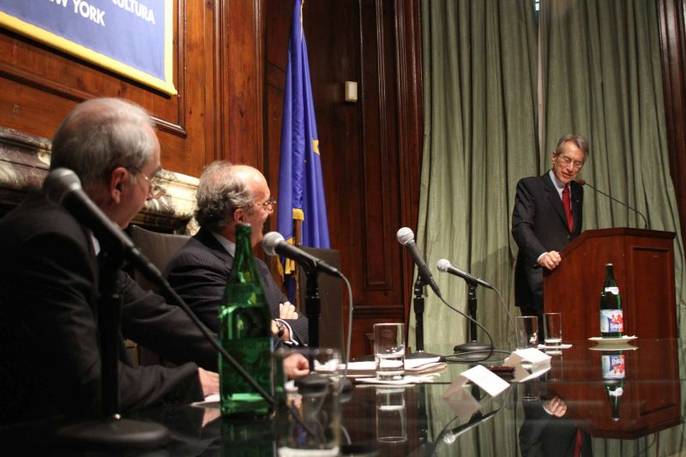


The public of the Italian Cultural Institute in New York [2] is used to conferences. Every year many influential personalities arrive from Italy to illustrate projects and ideas, but February 17 was an exceptional occasion. Instead of a conference or a panel, the public witnessed a lesson in contemporary history. The professor not only came from a prestigious university, but he is also one of the most famous Italian politicians in Italy and abroad, Giuliano Amato. What made it more interesting is that, beyond the many details and historical anecdotes, Amato offered a window on the present, so that the public could better reflect upon the upcoming celebrations of the 150th anniversary of the Italian unification.
The former Prime Minister's speech did not include comments about what is going on in Italy today, its delicate political and social situation, and Silvio Berlusconi's judicial affairs. On the contrary, the protagonists of the lesson were Gaetano Salvemini [3], Carlo Cattaneo [4] and other intellectuals and thinkers dear to Amato.
Present at the event were also the Italian Ambassador in Washington Giulio Terzi di Sant'Agata and former American Ambassador in Italy Richard Gardner, who thanked Giuliano Amato for his visit.
After a presentation by Riccardo Viale, director of the Institute, Giuliano Amato took the stage and began his lesson stating his “thesis”: Italy is an ancient and incomplete nation.
Borrowing from Ernest Renan [5], he explained the concept of 'nation'.
According to the French philosopher, a nation must have two basic elements, a common past and a common future. The past is not objective and the moments to remember must be chosen together by the society. Amato also recalled the teachings of Anne Marie Thiesse, who insisted upon a common choice of the moments to be inserted in a country's 'tradition'.
According to the former Prime Minister, Italian history began long before its Unification. In 1821 Manzoni wrote that Italy was one region, united by a single army, a single language and a single religion. Although disagreeing with the army statement, Mr. Amato agreed with the novelist's other two points.
“The project with which Italy was created was shared by many players although their actions were different”, said Amato. Garibaldi [6] and Mazzini [7] shared the same ideas with different plans of action, and the same holds true for Cavour [8], a “great statesman with expansionist aims, especially for his Piedmont”.
Therefore there was a difference between the country that existed and the country that was being dreamed of by the Italian protagonists of the nineteenth century. Visions for the future were also different. The idea of a federalist Italy, which did not materialize, was central for many thinkers of the time, including Cattaneo.
“But probably, that was the only possible Italy”, stated Amato, underlining the impossibility of creating a different system for Itay then; England and France would not have allowed Italy to have rulers outside of their sphere of action and control.
“And yet this Italy, although full of contradictions, was successful in many fields, for example the better education offered by the Italian Unification and the creation of the railroad system, Cavour's dream”, said the ex-Prime Minister.
Even Salvemini was a convinced federalist, but he thought that such an Italy was the only possible one and the only feasible one. He wrote a lot about the changing conditions of the poor in Italy, for instance the fact that burial in a cemetery only began to be “available” to the lower classes after 1861.
“There were many changes; but the Country was an accomplishment for the future”. An image of a future that was still uncertain and, especially, not shared by everyone.
Moving forward several decades, Italy found itself divided by extreme ideologies, “Fascists versus Communists”. “And yet our Italian creativity should make us feel united”, said Amato.
The celebrations for the anniversary of the Italian Unification are just a few days away, but Italians are still divided. People in the North recall their Celtic roots and many southerners yearn with nostalgia for their Bourbonic past. The choice of a common past and a shared vision of the future do not belong to the Italians; at least, not yet.
Amato concludes, “Italy is a united country, but not completely... Could we have Italy without the Italians?”. With this question, Amato left the public pondering upon the fate of this nation; beautiful but incomplete.
Source URL: http://test.iitaly.org/magazine/article/old-incomplete-nation
Links
[1] http://test.iitaly.org/files/frontamato1298400955jpg
[2] http://www.iicnewyork.esteri.it/IIC_Newyork
[3] http://en.wikipedia.org/wiki/Gaetano_Salvemini
[4] http://en.wikipedia.org/wiki/Carlo_Cattaneo
[5] http://en.wikipedia.org/wiki/Ernest_Renan
[6] http://en.wikipedia.org/wiki/Giuseppe_Garibaldi
[7] http://en.wikipedia.org/wiki/Giuseppe_Mazzini
[8] http://en.wikipedia.org/wiki/Camillo_Benso,_conte_di_Cavour